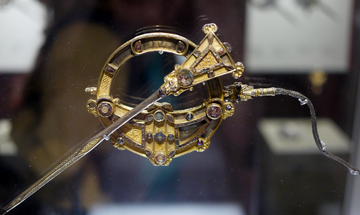Tara Brooch History
The Tara Brooch is regarded as one of the finest pieces of Celtic jewelry. It is an ornate Irish brooch dating from the 8th century AD. It was discovered in 1850 in a peat bog in Co. Meath, Ireland and is now on display in the National Museum of Ireland in Dublin. It is named after the Hill of Tara in Ireland, which was the ancient seat of the Irish kings. It is said to represent the sun, and is often worn as a symbol of allegiance to Ireland.

Photo: Tara brooch in National Museum, Dublin
Historical Meaning of the Tara Brooch
The Tara Brooch is significant both for its beauty and for its great age. It is one of the most accomplished examples of Celtic metalwork. It also has important historical associations. The Tara Brooch thus provides a rare glimpse into the art and culture of the ancient Celts.
Brooch Design
The Tara brooch is made of gold or silver, and is decorated with Celtic designs. The intricate design of this wonderful Irish brooch consists of cast and gilt bronze and consists of a series of intricate animalesque and zoomorphic designs. The function of the Tara Brooch is unknown, but it has been suggested that it may have been used as a cloak or garment fastener. The Brooch is a classic example of Celtic art and is regarded as one of the most significant finds from the Early Medieval period in Ireland.

Photo: Connemara marble Tara brooch
Since its discovery, Irish jewelers and designers have crafted replicas of this brooch. One example is the Connemara marble brooch pictured above.
To read more about Celtic symbolism you can view our blog.

